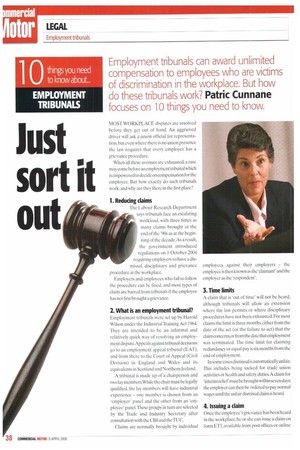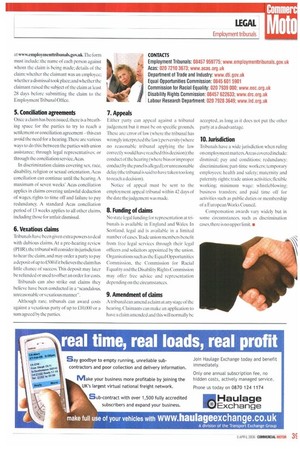Just sort it out
Page 38

Page 39

If you've noticed an error in this article please click here to report it so we can fix it.
Employment tribunals can award unlimited compensation to employees who are victims of discrimination in the workplace. But how do these tribunals work? Patric Cunnane focuses on 10 things you need to know.
MOST WORKPLACE disputes are resolved before they get out of hand. An aggrieved driver will ask a union official for representation,but even where there is no union presence the law requires that every employer has a grievance procedure.
When all these avenues are exhausted, a case may come before an employment tribunal which is empowered todecide on compensation for the employee. But how exactly do such tribunals work, and why are they there in the first place?
1. Reducing claims The Labour Research Department says tribunals face an escalating workload, with three times as many claims brought at the end of the '90s as at the beginning of the decade.As a result, the government introduced regulations on 1 October 2(X)4 requiring employers to have a dismissal, disciplinary and grievance procedure at the workplace.
Employers and employees who fail to follow the procedure can be lined, and most types of claim are barred from tribunals if the employee has not first brought a grievance.
2. What is an employment tribunal?
Linpioyment tribunals \\ ere s■21 up by Harold Wilson under the Industrial Training Act 1964. They are intended to he an informal and relatively quick way of resolving an employment dispute.Appeals against tribunal decisions go to an employment appeal tribunal (EAT), and from there to the Court of Appeal (Civil Division) in England and Wales and its equivalents in Scotland and Northern Ireland.
A tribunal is made up of a chairperson and two lay members, While the chair must be legally qualified, the lay members will have industrial experience — one member is chosen from an 'employer' panel and the other from an 'employee' panel.These groups in turn are selected by the Trade and Industry Secretary after consultation with the CBI and the TUC.
Claims are normally brought by individual employees against their employers — the employee is then known as the'claimant' and the employer as the 'respondent'.
3. Time imib
A claim that is 'out of time' will not be heard, although tribunals will allow an extension where the law permits or where disciplinary procedures have not been exhausted. For most claims the limit is three months, either from the date of the act (or the failure to act) that the claim concerns, or from the date that employment was terminated. The time limit for claiming redundancy or equal pay is six months from the end of employment.
In some cases dismissal is automatically unfair. This includes being sacked for trade union activities or health and safety duties.A claim for 'interim relief' must be brought within seven days; the employer can then be ordered to pay normal wages until the unfair dismissal claim is heard.
4. Issuing a claim Once the employee's grievance has been heard in the workplace, he or she can issue a claim on form ET1, available from post offices or online at www.employmenttribunals.gov.A.The form must include: the name of each person against whom the claim is being made; details of the claim; whether the claimant was an employee; whether a dismissal took place; and whether the claimant raised the subject of the claim at least 28 days before submitting the claim to the Employment Tribunal Office.
5. Conciliation agreements
Once a claim has been issued, there is a breathing space for the parties to try to reach a settlement or conciliation agreement —this can avoid the need for a hearing. There are various ways to do this: between the parties with union assistance; through legal representatives; or through the conciliation service,Acas.
In discrimination claims covering sex, race, disability, religion or sexual orientation. Acas conciliation can continue until the hearing. A maximum of seven weeks' Acas conciliation applies in claims covering unlawful deduction of wages, rights to time off and failure to pay redundancy. A standard Acas conciliation period of 13 weeks applies to all other claims, including those for unfair dismissal.
6. Vexatious claims Tribunals have been given extra powers to deal with dubious claims. At a pre-hearing review (11 IR). the tribunal will consider its jurisdiction to hear the claim, and may order a party to pay a deposit of up to f_500 if it believes the claim has little chance of success. This deposit may later be refunded or used to offset an order for costs.
Tribunals can also strike out claims they believe have been conducted in a "scandalous. unreasonable or vexatious manner".
Although rare, tribunals can award costs against a vexatious party of up to £10,000 or a sum agreed by the parties.
7. Appeals
Either party can appeal against a tribunal judgement but it must be on specific grounds. These are: error of law (where the tribunal has wrongly interpreted the law); perversity (where no reasonable tribunal applying the law correctly would have reached this decision);the conduct of the hearing (where bias or improper conduct by the panel is alleged );or unreasonable delay (the tribunal is said to have taken too long to reach a decision).
Notice of appeal must be sent to the employment appeal tribunal within 42 days of the date the judgement was made.
8. Funding of claims
No state legal funding for representation at tribunals is available in England and Wales. In Scotland, legal aid is available in a limited number of cases.Trade union members benefit from free legal services through their legal officers and solicitors appointed by the union. Organisations such as the Equal Opportunities Commission, the Commission for Racial Equality and the Disability Rights Commission may offer free advice and representation depending on the circumstances.
9. Amendment of claims
A tribunal ean amend a claim at any stage of the hearing. Claimants can make an application to have a claim amended and this will normally he accepted, as long as it does not put the other party at a disadvantage.
10. Jurisdiction
Tribunals have a wide jurisdiction when ruling on employment matters.Areas covered include: dismissal; pay and conditions; redundancy; discrimination; part-time workers: temporary employees; health and safety; maternity and paternity rights: trade union activities; flexible working; minimum wage; vvhistleblowing; business transfers; and paid time off for activities such as public duties or membership of a European Works Council.
Compensation awards vary widely but in some circumstances, such as discrimination cases, there is no upper limit. •
































































































































































































